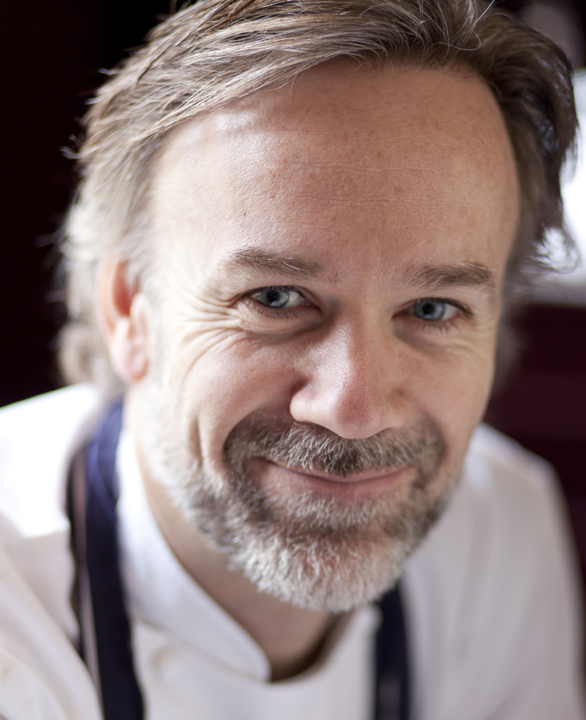
Marcus Wareing – Something Fresh
Marcus Wareing at The Berkeley will close for a two-month refurbishment in January and will reopen simply as Marcus. The two-Michelin-starred chef tells Selma Day how it will be “very Belgravia”
Why have you decided to revamp the restaurant now?
I’ve been here ten years now – five years of Pétrus and five years on my own – and the room, from a design point of view, is the same as when we opened. So I approached our partners, the Maybourne Hotel Group, last year with an idea, and we’ve gone with it.
What changes are you making?
There will be no change in the concept of the cuisine – it’s all about the look, the feel and the design. I’m opening it up, introducing lighter colours, different floor coverings and having a bigger, grander entrance.
The chef’s table will be more open and we’ll be making the restaurant more spacious. It will also be more relaxed. I want people, especially in Belgravia, to feel that they don’t have to wait three months to book or have to sit here for three hours. But I also want it to be plush and luxurious – very Belgravia.
How’s the business doing?
Business has been great, it’s been a really good year. Last year was tough, even though the Olympics were here. People were being cautious and, of course, other big restaurants opening in the area had an effect. Dinner, Bar Boulud, Pierre Koffmann, Pétrus, Cut, Alain Ducasse – there are a lot of top chefs. It’s fantastic for the area, but to say it’s not had an effect, I’d be lying. It has, and it’s made me realise that competition is healthy, but it also makes you re-look at yourself.
How has your food evolved?
It’s interesting, because I don’t think my cuisine has been judged since the Pétrus days, maybe a little when I reopened here as Marcus Wareing, but I think if all the critics came back today they would see something very different on the plate. My food has evolved so much. It’s definitely up where I want it to be. For me, it is cutting edge in every way I can make it.
Are Michelin stars as important to you as when you first started?
I think Michelin is still important because of its history, but once you’ve got one or two Michelin stars, as I have, I think you learn to live with them. It’s not as pressured as you think, because the way you run your business and the way you work is your way of life. You just get on with it and enjoy it.
Has your customer changed over the years?
If you go back ten years to when I came to The Berkeley, this was a business restaurant. The business is still here, but the business meetings have very much changed. I think now it’s a very mixed group and it covers all areas, whether it be a financial meeting or a birthday or anniversary. What I want to do now is to attract more of the community, because they are my bread and butter. I think that’s the key to any long-term success.
What do you think of London’s dining scene at the moment?
It’s very interesting to see new places opening – it’s good for the economy, it’s creating jobs and it’s got people spending. Personally, I’d rather be in the position I am in at the moment, with all the time I’ve had here, than be something brand new and hip and cool and trendy, because you can’t judge a good restaurant on the first meal. You’ve got to judge it over time, and I think longevity is the test.
Do you still get the same buzz running restaurants?
Yes – I’ve always longed to run restaurants. There is no pressure for me to change this restaurant, but I’m about to just break it all down and invest a lot of money in doing something that’s going to make life harder for me. I’m going to be under the microscope again and people are going to come and look at what we’re doing. I also know that a restaurant is for life – it’s not just a 100-metre sprint, it’s a bloody long marathon and some more. There’s a lot to do and there are only so many hours in the day, and I’ve got my children, my family and I run the business. It’s not just the catering – cooking’s easy. I am the CEO and MD all wrapped up in one. But I do it all because I feel very excited about what we do.
What are your plans for Christmas?
Christmas is when you really see a community here. There are lots of different things going on – you’ve got the fair [Winter Wonderland] across the road, and the fantastic church services. And, of course, it’s Belgravia so there’s an amazing look about the place. But for me, it’s just crazy. I get up Christmas Day, we have our breakfast and open our presents and I’m in work between 11.30am and 11.45am. I get home for about six o’clock, so I’m here for a good five hours. At home we always have a traditional Christmas dinner. I love it – I don’t want to change it. I don’t want a goose, I don’t want a piece of beef, I just want a nice turkey.
I’m looking forward to this Christmas more than I did as a child, because it’s the end potentially of this and the beginning in January of a brand-new start. I love the changes in restaurants, because restaurants are living, breathing things – they are about heart and soul. And I’m really excited about coming here in the new year and seeing the whole thing evolve into something very special.

